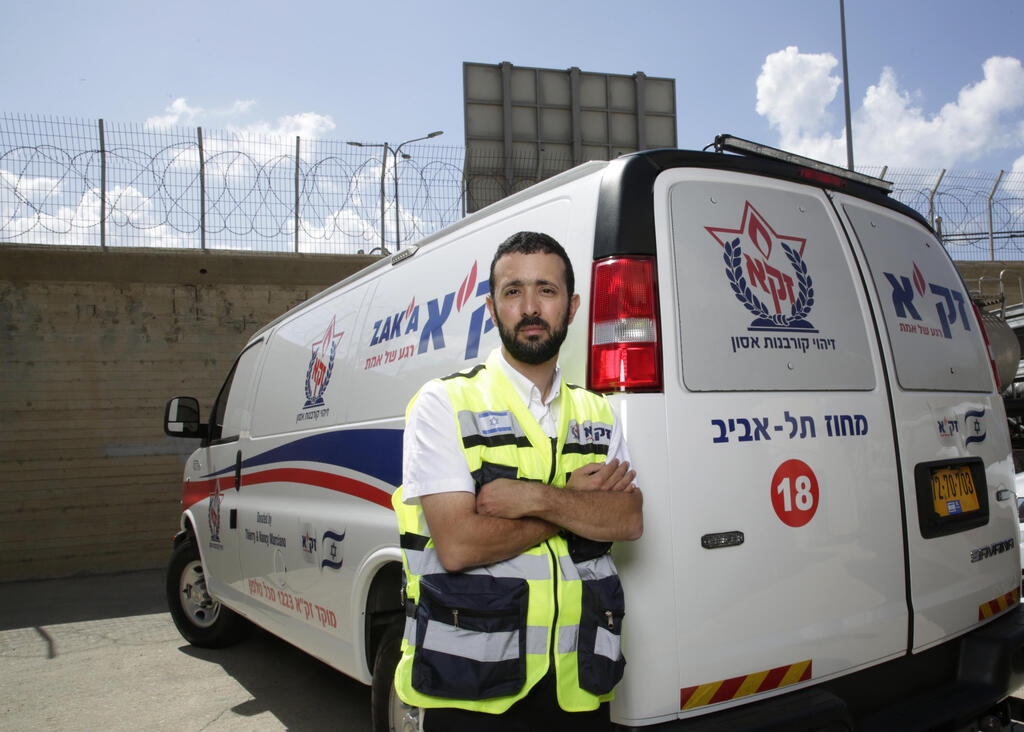Getting your Trinity Audio player ready...
Around 200 volunteers of the ZAKA emergency organization worked at the Shura IDF camp in Ramla, where approximately 1,200 bodies were transferred in the days following October 7 for identification.
Eli Turjeman, 39, a father of five, was among them. He arrived at Shura on the night of October 7 and later continued working at the National Center of Forensic Medicine in Tel Aviv.
A decade-long ZAKA volunteer, Turjeman had witnessed horrific scenes before, including the 2021 Lag BaOmer stampede on Mount Meron which claimed 45 lives, but October 7 was different.
"Sadly, I've been at numerous events, including the Meron disaster, where I handled all 45 bodies. I've seen my share of death. I’ve been part of teams that handled every imaginable kind of natural and unnatural death—crime scenes, car accidents, terror attacks. I’ve dealt with dozens if not hundreds of children. But nothing compares to what I saw after the massacre.
3 View gallery


Turjeman (third from left) in the National Center of Forensic Medicine in Tel Aviv
(Photo: ZAKA)
“We’d never seen anything like it, neither in scale nor brutality. What struck me most was the degradation—the state of the bodies. Bound, burned, dismembered, children. We were the first to open the body bags and witness the devastation. Seeing such mass cruelty broke us.
"I was at the camp extensively during the first week, then went south for two days to collect bodies, and later worked at the Center of Forensic Medicine, where the hardest cases, bodies that couldn’t be identified, were sent. It’s indescribable. I would occasionally return to Shura to help. I’d finish at the center around 9 p.m., drive to Shura, stay until 2 or 3 a.m., and return to the center by 7 a.m.
3 View gallery


Turjeman inside a home in Kibbutz Nir Oz, reduced to ruins by terrorists during the October 7 attacks
"The real gut punch was that first morning when we left the camp and saw the families—crowds of hysterical, screaming families. It was difficult, but it pushed us to keep going, to give them answers and allow them to bury their loved ones. We knew the number of hostages wouldn’t be clear until our work was done, so we worked quickly, pulling double and triple shifts.
"There was a rabbinical ruling allowing us to continue working on weekends and violate Shabbat, which, as a Haredi Jew, was very hard for me. We worked around the clock, coming home at night, boiling bloodstained clothes, sleeping for a few hours, and going back. The smell was unbearable, and I’ll never forget it.
"There are soldiers on the battlefield, doctors in hospitals, and then there’s us. Everyone does their part. Not everyone can handle this."
"You can’t handle that many bodies and remain the same person. People hear names, but we see faces. It stays with us; it never ends. We’re still there, reliving it over and over. I still see the faces and smell the stench. I always tell my fellow ZAKA volunteers—anyone who says they’re unaffected is lying. You can’t face such brutality and not be affected. And it's especially hard because we’re still at war. Every mention of hostages or another fallen soldier brings us back to October 7.
"I continue volunteering at the Forensic Center. How do I find the strength? This is my country. It's what I can give. When someone else is ready to take my place, I’ll gladly step aside. But until then, we’ll keep doing this. There are soldiers on the battlefield, doctors in hospitals, and then there’s us. Everyone does their part. Not everyone can handle this, but God gave me the strength to do it, and this is my mission."
Get the Ynetnews app on your smartphone:



